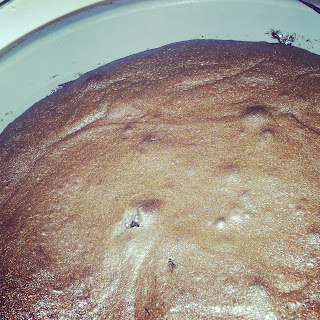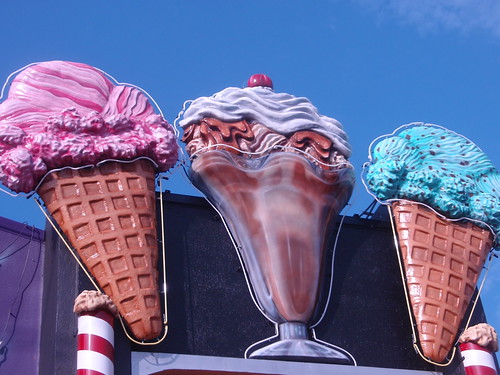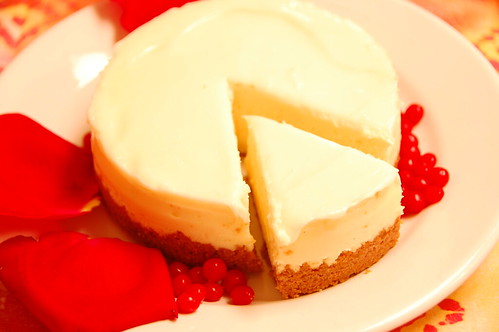Sometimes gluten-free baking requires a little bit of knack. The springiness that gluten imparts on baked goods means that using substitutes like buckwheat flour, rice flour or one of the many blends sometimes necessitates a pinch of something extra, like psyllium husk (see here for Gluten-Free Girl's explanation).
 But the idea that you need to be some kind of wizard to bake gluten-free is a myth. I've heard plenty of hand-wringing from bakeries, restaurants and cafes about how it's just so hard to replicate anything gluten-free that they gave up trying. The ingredients are impossible to source, they tell me, we can't produce something of the right quality. I hear all the time that it just isn't feasible to create a gluten-free dessert for the 1 in a 100th customer who might ask for one.
But the idea that you need to be some kind of wizard to bake gluten-free is a myth. I've heard plenty of hand-wringing from bakeries, restaurants and cafes about how it's just so hard to replicate anything gluten-free that they gave up trying. The ingredients are impossible to source, they tell me, we can't produce something of the right quality. I hear all the time that it just isn't feasible to create a gluten-free dessert for the 1 in a 100th customer who might ask for one.
But I'm calling time on these excuses. Basic gluten-free cake baking can be a complete doddle. In fact, it just got a whole lot easier now that European supermarkets are selling a ready-mix to make gluten-free chocolate fondant cake.
I don't mean those 'just add an egg, water and butter' cupcake cake mixes. There is nothing to add. Put one of these babies in your cupboard and the next time you have surprise gluten-free guests (or just a midnight urge for chocolate cake), you can go from hungry to dessert heaven in less than 20 minutes.
STEP ONE: pour the mix into your baking tin
Gloriously thick, slightly resembling chocolatey tar, but who cares? Even I could achieve this with a raging hangover and barely half an hour to spare.
STEP TWO: there is no step two
That's right. You're done. Shove the baking tin in the oven, wait for a few minutes, and bite your fingernails nervously, worrying about what kind of culinary monstrosity you're about to unleash on the world. How could it possibly taste good, without any whipping, creaming, rising or any of the chemical magic we're told is essential to produce an edible gluten-free cake?
 But there it is, after 15 minutes in my oven, it's looking exactly like a chocolate cake should. Warm, fluffy, a little bit like the surface of the moon, smelling divine and begging for a generous slathering of ice cream.
But there it is, after 15 minutes in my oven, it's looking exactly like a chocolate cake should. Warm, fluffy, a little bit like the surface of the moon, smelling divine and begging for a generous slathering of ice cream.
And here's the real shocker: it was actually a lot better than some of my bespoke gf chocolate cake creations. It was very rich and smooth, and hot from the oven it was moist enough to serve as one of those melty-on-the-inside chocolate fondants (or self-saucing puddings as the Australian Wheaty Eater calls them).
Naturally, I rushed a slice over to the Wheaty Eater to get his verdict on the cake. He's partial to a self-saucing pudding, has a weakness for chocolate, and his nose was twitching at the chocolatey aroma from the kitchen. My initial intention was not to admit it was a ready-mix until I had his verdict on how it tasted, to keep him impartial.
 But that didn't quite work out. I got so much praise for the cake that I couldn't bear to let on that this was a product of French culinary genius and not of my own hours wasted in the kitchen. I smiled serenely, lapped up the praise, and helped myself to a second slice. Sorry, Wheaty.
But that didn't quite work out. I got so much praise for the cake that I couldn't bear to let on that this was a product of French culinary genius and not of my own hours wasted in the kitchen. I smiled serenely, lapped up the praise, and helped myself to a second slice. Sorry, Wheaty.
The verdict: The fact that this is achievable will soon demolish the excuses that restaurants give for not providing more than a fruit salad for gluten-free guests. As mixes like this become more readily available (and good lord, they most certainly will), it will become a lot harder for caterers to claim they don't have the time or resources to provide for coeliacs. The future is nearly here, and it tastes pretty sweet.
Are there gluten-free mixes or ready-meals that have changed your life? Or do you cook everything from scratch? Let me know in the comments!
 But the idea that you need to be some kind of wizard to bake gluten-free is a myth. I've heard plenty of hand-wringing from bakeries, restaurants and cafes about how it's just so hard to replicate anything gluten-free that they gave up trying. The ingredients are impossible to source, they tell me, we can't produce something of the right quality. I hear all the time that it just isn't feasible to create a gluten-free dessert for the 1 in a 100th customer who might ask for one.
But the idea that you need to be some kind of wizard to bake gluten-free is a myth. I've heard plenty of hand-wringing from bakeries, restaurants and cafes about how it's just so hard to replicate anything gluten-free that they gave up trying. The ingredients are impossible to source, they tell me, we can't produce something of the right quality. I hear all the time that it just isn't feasible to create a gluten-free dessert for the 1 in a 100th customer who might ask for one.But I'm calling time on these excuses. Basic gluten-free cake baking can be a complete doddle. In fact, it just got a whole lot easier now that European supermarkets are selling a ready-mix to make gluten-free chocolate fondant cake.
I don't mean those 'just add an egg, water and butter' cupcake cake mixes. There is nothing to add. Put one of these babies in your cupboard and the next time you have surprise gluten-free guests (or just a midnight urge for chocolate cake), you can go from hungry to dessert heaven in less than 20 minutes.
STEP ONE: pour the mix into your baking tin
Gloriously thick, slightly resembling chocolatey tar, but who cares? Even I could achieve this with a raging hangover and barely half an hour to spare.
STEP TWO: there is no step two
That's right. You're done. Shove the baking tin in the oven, wait for a few minutes, and bite your fingernails nervously, worrying about what kind of culinary monstrosity you're about to unleash on the world. How could it possibly taste good, without any whipping, creaming, rising or any of the chemical magic we're told is essential to produce an edible gluten-free cake?
 But there it is, after 15 minutes in my oven, it's looking exactly like a chocolate cake should. Warm, fluffy, a little bit like the surface of the moon, smelling divine and begging for a generous slathering of ice cream.
But there it is, after 15 minutes in my oven, it's looking exactly like a chocolate cake should. Warm, fluffy, a little bit like the surface of the moon, smelling divine and begging for a generous slathering of ice cream.And here's the real shocker: it was actually a lot better than some of my bespoke gf chocolate cake creations. It was very rich and smooth, and hot from the oven it was moist enough to serve as one of those melty-on-the-inside chocolate fondants (or self-saucing puddings as the Australian Wheaty Eater calls them).
Naturally, I rushed a slice over to the Wheaty Eater to get his verdict on the cake. He's partial to a self-saucing pudding, has a weakness for chocolate, and his nose was twitching at the chocolatey aroma from the kitchen. My initial intention was not to admit it was a ready-mix until I had his verdict on how it tasted, to keep him impartial.
 But that didn't quite work out. I got so much praise for the cake that I couldn't bear to let on that this was a product of French culinary genius and not of my own hours wasted in the kitchen. I smiled serenely, lapped up the praise, and helped myself to a second slice. Sorry, Wheaty.
But that didn't quite work out. I got so much praise for the cake that I couldn't bear to let on that this was a product of French culinary genius and not of my own hours wasted in the kitchen. I smiled serenely, lapped up the praise, and helped myself to a second slice. Sorry, Wheaty.The verdict: The fact that this is achievable will soon demolish the excuses that restaurants give for not providing more than a fruit salad for gluten-free guests. As mixes like this become more readily available (and good lord, they most certainly will), it will become a lot harder for caterers to claim they don't have the time or resources to provide for coeliacs. The future is nearly here, and it tastes pretty sweet.
Are there gluten-free mixes or ready-meals that have changed your life? Or do you cook everything from scratch? Let me know in the comments!




